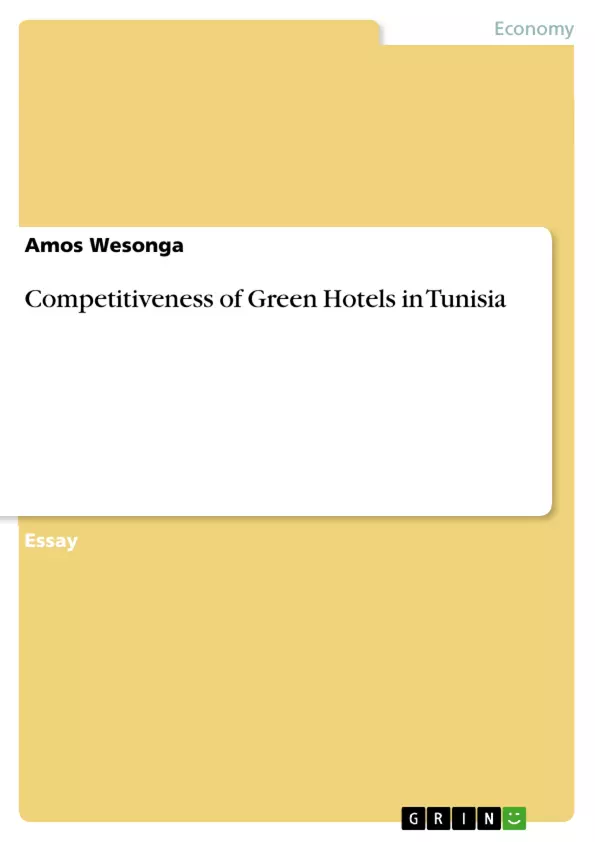One of the critical roles of management in any business is to reduce the cost of running the office as they provide the best services in the markets. The green management policies that have been adopted by some hotels have been assumed to offer customers with extra satisfaction apart from the general services provided in the hotel, thus, associated with business prosperity. In this regard, researchers have obtained some interest in establishing whether green management policies have a competitive advantage in the hotel industry. They tend to determine whether there is any connection between the adoption of green building design and the understanding of visitors regarding service delivery. In particular, the results of these studies are meant to stabilize and make green management policies a vital competitive approach in the hotel industry and at the same time, support environmental and health safety
Inhaltsverzeichnis (Table of Contents)
- Introduction
- Competitive Advantages of Green Management Policies
- Optimized management of natural resources and reduced costs of consumption
- Reduced unemployment
- Tapping into the global green tourist niche
- Sustainable tourism
- Criteria to Join the Tunisian Eco-Label Certification
- Green Building Design and the Perception of the Visitors
Zielsetzung und Themenschwerpunkte (Objectives and Key Themes)
This study aims to investigate the competitive advantages of green management policies in the Tunisian hotel industry, particularly focusing on the impact of green design innovations and the criteria for hotels to join the Tunisian eco-label certification program. It also explores the connection between green building design and visitors' perceptions of services offered.
- Competitive advantages of green management policies in the hotel industry
- Impact of green design innovations on hotel competitiveness
- Criteria for Tunisian eco-label certification
- Relationship between green building design and visitors' perceptions
- Sustainable tourism and environmental protection
Zusammenfassung der Kapitel (Chapter Summaries)
- Introduction: This chapter introduces the research topic and its relevance to the Tunisian hotel industry, outlining the study's objectives and methodology.
- Competitive Advantages of Green Management Policies: This chapter explores the various competitive advantages of adopting green management policies in the Tunisian hotel industry, including optimized resource management, reduced costs, job creation, attracting global green tourists, and promoting sustainable tourism.
- Criteria to Join the Tunisian Eco-Label Certification: This chapter examines the criteria used for hotels to join the Tunisian eco-label certification program, focusing on the perceived benefits of such certification, including networking, revenue generation, and environmental protection.
- Green Building Design and the Perception of the Visitors: This chapter investigates the relationship between the adoption of green building design in Tunisian hotels and visitors' perceptions of the services offered, exploring the impact of green design on visitor satisfaction and their understanding of the services provided.
Schlüsselwörter (Keywords)
This study explores key concepts like green management policies, green hotels, competitiveness, sustainable tourism, Tunisian eco-label certification, green building design, and visitor perceptions. It examines the impact of these factors on the hotel industry's performance and sustainability.
Frequently Asked Questions
What is the main focus of this study on green hotels?
The study investigates the competitive advantages of green management policies in the Tunisian hotel industry, focusing on design and certification.
What are the primary advantages of green management policies for hotels?
Key advantages include optimized natural resource management, reduced operational costs, job creation, and attracting global green tourists.
What is the Tunisian Eco-Label certification?
It is a certification program that hotels can join to demonstrate environmental protection, which also aids in networking and revenue generation.
How does green building design affect visitor perception?
The study explores how green design innovations impact visitor satisfaction and their understanding of the quality of service delivery.
What role does sustainable tourism play in this context?
Sustainable tourism is presented as a vital competitive approach that supports environmental safety and health while ensuring business prosperity.
- Arbeit zitieren
- Dr. Amos Wesonga (Autor:in), 2017, Competitiveness of Green Hotels in Tunisia, München, GRIN Verlag, https://www.grin.com/document/439534



